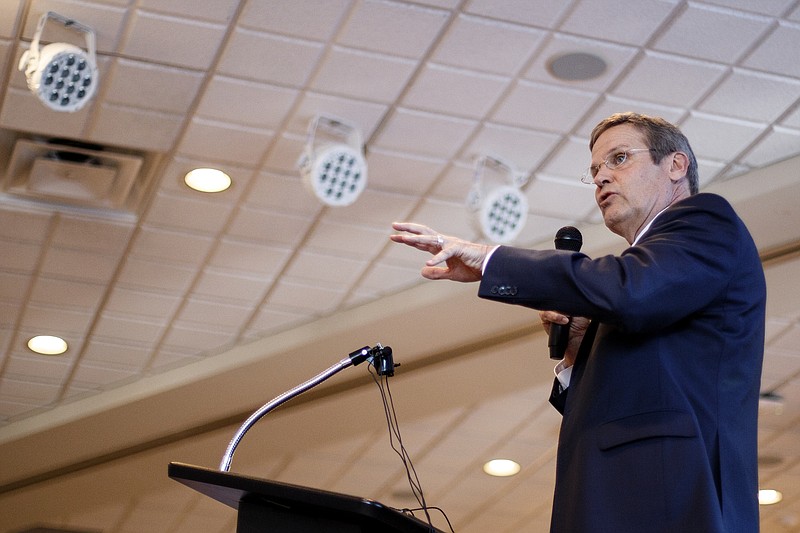Tennessee Gov. Bill Lee told the story when he first visited the Times Free Press two years ago, and he was recounting it again to a group of Chamber of Commerce-invited Chattanoogans in a meeting room on the seventh floor of the EPB building last Friday.
The story concerned his work several years ago with an inner-city child named Adam and how the student who was "failing every subject" improved when he was moved to a Nashville-area charter school.
"His outcome dramatically changed," Lee told this page after the Chamber of Commerce gathering.
The governor said the experience made him wonder about other students left behind.
"It started me thinking more broadly about education, about education choice, about why charters worked," Lee said, "and what more we can do to provide education choice."
What resulted, for one, is a proposal that could make it easier to create charter schools, which are privately run public schools which use state and local tax dollars to operate but may have fewer state rules and regulations.
They currently may be created only in districts with schools that have test scores in the bottom 5 percent of schools statewide.
Lee's proposal would allow them to expand to other counties and would create a new state charter authorization board - instead of the state board of education - to give them final approval. Charter applicants would have to go through their local school boards, as they do now, for initial approval, but the charter authorization board could overrule the school boards.
The latter was a change from his original bill, which also would have let charter applicants go straight to the new authorization board for approval.
"That was an easy adjustment," Lee said. "There were concerns that the local authority should have the first opportunity [to approve or disapprove the schools]. Our goal in creating a separate board was that it understood charters. And the state [Department of Education] is supportive of an independent agency that uniquely understands them."
An additional amendment was added to the House bill Monday, giving it an eight-year expiration date, a sunset provision often used for new agencies and to help ensure legislative oversight.
Brent Easley, Lee's legislative director, said the administration had no objection to the change.
We see both amendments as helpful in ensuring that any charter school created must, at a minimum, do no harm. Indeed, they should allow students who move to them to improve and thrive. If they are not doing that for a majority of their students, their continued existence should be carefully examined.
A more controversial educational proposal that stemmed directly from the governor's experience with the inner-city child is the creation of educational savings accounts that could be used by low-income parents with students in districts whose test scores put them in the bottom 10 percent of schools in the state. In effect, that includes only five counties (including Hamilton), plus the Achievement School District, which oversees schools overtaken by the state.
The proposal, which could tweaked as it moves through the legislature, allows qualified parents to use about $7,300 for private schools, home schools, online schools and even for the likes of transportation, uniforms and computers.
A critical difference between Lee's and previous voucher-type bills is that money in the budget already will be dedicated to the educational savings accounts - 5,000 of them initially - so it will not follow the students if they choose another route for their education. Indeed, if students do leave, the school's per-pupil ratio of money from the state would rise.
"That's actually true," he said. "That's part of the beauty of this - more dollars per pupil. It would allow [districts] to put a focus on poor-performing schools."
Lee said while the plan - which would start in the 2021-2022 school year - may not have received as much criticism as previous proposals, there has been "lots of misinformation about it."
"We created it as the Tennessee plan that is not the plans of old," he said. "It addresses many of the concerns people have had."
In general, we support Lee's plan, but we do have concerns about how the money might be used if it does not go directly to private or online schools that would enroll a former public school student. If it goes directly to other schools, it will require accountability. But if it goes to parents who might use it for a variety of supposedly educational items, it will require an even greater amount of answerability.
Those accountability measures must be worked out before this bill passes.
Nevertheless, by offering more public school teacher raises and other new public school proposals for rural counties, vocational and technical education, school safety and STEM programs, Lee is keeping the pedal to the metal on improving education for all Tennessee students.
"I want it to be the best in the country," Lee said. "I want not either/or [strengthening public schools or offering school choices] but both/and."
